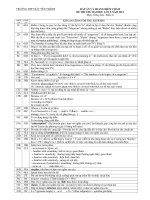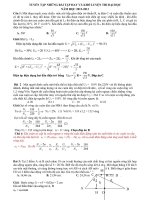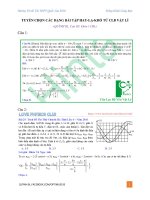READING tiếng anh ( hay và khó) trích trong đề thi thử olympic tiếng anh 304
Bạn đang xem bản rút gọn của tài liệu. Xem và tải ngay bản đầy đủ của tài liệu tại đây (68.36 KB, 5 trang )
I/
Red Rock Canyon, part of the Red Rock Recreation Lands in Nevada, is an escarpment of
crimson Aztec sandstone cliffs and canyon walls that (1) ……………………the geologic
history of the area. Bands of sediment layers tell of a deep-sea bed that 400 million years ago
(2)…………………………….. eastward to a shoreline in present-day western Utah. As the
ancient sea grew (3)…………………………. more shallow, about 225 million years ago,
marine limestone and shales were overlaid by sediments washed in from emerging land
areas. As the water in the shallow inland seas evaporated, salts and minerals were deposited
in thick beds and fluctuating shorelines created intermixed beds of limestone, shales, and
minerals. Sediments from this period gave the canyon its name. Their red colour was created
from the weathering of (4)…………………….. within. About 180 million years ago, the
area became arid and was covered in sand dunes more than 2,000 feet deep, which became
cemented into the Aztec sandstone that is (5)…………………………….. in the canyon
today. Its alternating hues of red, yellow, and white are believed to have resulted from
groundwater percolating through the sand and leaching (6)……………………… the
oxidized iron.
The most significant geologic (7)……………..of the area is the Keystone Thrust fault, a
fracture in the earth’s crust. Sixty-five million years ago, (8)…………….. pressure thrust
one rock plate over another, a (9)………………… that can clearly be seen in the contrasting
bands of gray limestone and red sandstone, where the gray limestone cap is actually older
than the sandstone beneath it. The Keystone is one of the most easily identifiable thrust
faults to be (10)………….. anywhere.
1 A enclose
2 A grew
3 A progressively
4 A complexities
5 A dominating
6 A out
7 A character
8 A tense
9 A event
10 A found
B give
B evolved
B painstakingly
B compounds
B sufficient
B into
B feature
B intensive
B incident
B located
C mention
D mention
C rose
D stood
Cconstantly
D precedingly
C combinations
D composites
C prominent
D principle
C against
D with
C trait
D proverty
C intense
D extreme
C phenomenon
D occurrence
C noted
D realized
II/
The changing face of Britain
It seemed to the generation of Britons alive before the Second World War that their way of
life would last for many years to come. However, the war caused a (11) …………… in
British life that completely changed the status quo . What had been a fairy (12) …………….
society up to that point, with people sharing many basic beliefs and values, underwent (13)
…………….. changes after the war. The (14) …………….. was away from fixed social
roles and towards a more (15) …………….society. Britain began to (16)
……………………….into its present form and many ideas that are accepted today, such as
a large amount of freedom for teenagers, were at the time (17)………………..and exciting.
New and (18)………………… music and fashion had a great (19)……………… on young
people and the whole of Britain became less (20)………………….
11. A. revolution
12. A. uniform
13. A. refined
14. A. reform
15. A. revised
16. A. refine
17 . A. novel
18. A. internal
19. A substitute
20 A. conservative
B. revision
B. same
B. potential
B. trend
B. amended
B. progress
B. mature
B. incoherent
B progress
B concerned
C. rotation
C. similar
C. alternative
C. fashion
C. dynamic
C. substitute
C. alternate
C. innate
C. influence
C convinced
D. rejection
D. identical
D. radical
D. decay
D. different
D. evolve
D. steady
D. innovative
D. innovation
D contained
II/
Horses for courses
American psychologists have been looking into how a child’s position in the family can
affect his or her selected career.
It would appear that first born and only children are more likely to be high achievers, (21)
…………. professions such as law, finance, engineering or medicine. According to
Professor Frederick Leong, co-author of the psychologists’ report, their (22) ……………..is
to head towards ‘cognitive and analytical’ work. Professor Leong puts this (23)……………
to the fact that parents are more likely to be more over (24)……………. towards first born
or only children. Examples of famous names demonstrating this principle include Anthony
Scrivener QC, Sir Winston Churchill and Sir Edward Heath.
Younger siblings, on the other hand, are more likely to be (25)………….to take up more
creatively based or outdoor based occupations, such as landscape gardening, fashion, music
and art as (26)……………..by Oscar Wilde, Yehudi Menuhin and Madonna.
Professor Leong’s overall explanation is that, ‘Parents typically (27)……………..different
demands and have different (28)……………..of children, depending on their birth order.
Parents of only children may discourage pursuit of physical or outdoor activities because
they are more fearful of physical harm to their child. That may be why only children are
more likely to show interest in academic pursuits rather then physical or outdoor activities.
And those who are only children will tend to get more time and attention from their parents
than children with siblings.’
He goes on to point out how the (29)……………. tends to happen in larger families, ‘As
they have more children, parents tend to become more open and relaxed, and that may allow
younger children to be more risk-taking. If the first born or only child wants to be a poet,
that may concern parents. But by the fourth child parents may not (30)……………. as
much.’
21 A pursuing
B chasing
C driving
D tracking
22 A trend
B direction
C bias
D tendency
23 A on
B up
C don
D over
24 A guarding
B protective
C covering
D watchful
25 A destined
B intended
C designed
D fated
26 A exhinbited
B displayed
C depicted
D exemplified
27 A rest
B plant
C fix
D place
28 A prospects
B expectations
C outlook
D possibilities
29 A alternative
B counter
C converse
D contrast
30 A oppose
B mind
C dispute
D contend
Đáp án
1
D
2
3
4
5
6
7
8
9
10
11
12
13
14
15
16
17
18
19
20
21
22
23
24
25
26
27
C
A
B
C
A
B
C
C
A
A
A
D
B
C
D
A
D
C
A
A
D
C
B
A
D
D
28
29
30
B
C
B
thank for watching









